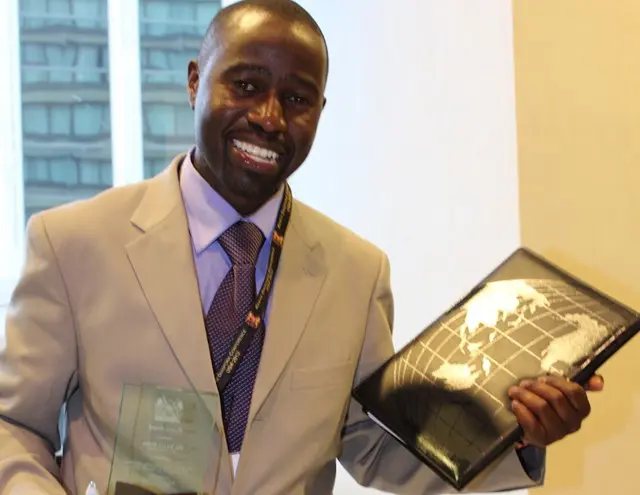
The Story behind Myles of Great Hopes – Cary North Carolina. When Isaac Kuria settled in America, he brought his fellow Kenyans with him–in his heart. He came initially under a program with the YMCA–International Camp Counseling Program (ICCP) New York – New York. He was then posted to work at Camp Seafarer, Arapahoe NC.
He made many friends, campers, counselors, staff members, directors, and international friends who spent their summer at the camp. He told stories about his country, loving to share, including leading a Hakuna Matata song during an Independence Day fireworks celebration at Camp Seagull, next to the Neuse River.
Isaac remained a Y member in Thika and Nairobi Central Y. His experience continued to help remind him that youth and young children had special powers in them. As he commuted back and forth between Kenya and United States, he reflected on these experiences.
The irony in the Hakuna Matata song, made famous by the movie Lion King, is a Swahili phrase meaning “no worries–no problems”. In Kenya, the people are very kind, welcoming and this song is a national symbol.
They will share however little they have. It’s one place where you do not have to worry about going to the farm or a trip and leaving your child with a neighbor. It’s a place where a child’s upbringing is a society or a village obligation. This is because of the close relationships, care, and virtues the people share. In that sense, “hakuna matata” fits.
However, when it comes to basic human needs like water, medical care, and other resources, Isaac wishes to differ with the Hakuna Matata song. He cautions not to be fooled into thinking all is well.
He says according to United Nations International Children’s Emergency Fund – UNICEF, access to safe water and sanitation facilities is limited. More than 15 million people – including more than half the rural population – are without access to safe water or sanitation facilities.
This translates to people living below the poverty line at 46%, while Kenya’s population stands at 40,512,682 per the social statistics indicators – 2010 (ruralpovertyportal.org). Kids going to school with bare feet, wearing torn uniform clothes from older brothers and sisters, and embracing just a cup of tea is typical to many families.
No dental visits–and at times using Cyprus tree branches for brushing teeth is normal. The poor of poor families has no luxury of getting tooth brush and paste. The resources are scarce. Isaac says Kenya is a very beautiful country, with first world amenities, technology, infrastructure, education, wildlife, diversity and modern ways of doing business.
The food is very nutritional and organic. Sometimes a tourist visiting the country may access services as he would back home. Unfortunately, the gap between the upper class, the middle class, and the poor is so unbearable. Isaac had to remain a voice for the less fortunate.
He remembers his teacher Mr. Kiaritha repeating a phrase while he was in elementary school. The phrase, almost like a song, was "you are the leaders of tomorrow.” Isaac says that tomorrow has been gone. We must take responsibility, however small—it all counts. Isaac commuted between Kenya and the United States for a few summers. He was loved at Camp Seafarer for the positive impact he made.
Later, he settled in Cary, NC. He extended his love and devotion to others through soccer clinics for kids while working at the Finley YMCA North Raleigh. He organized soccer for Kenyans here in Raleigh. Additionally, he helped initiate the partnership of Raleigh and Nairobi as Sister Cities. He coordinated Kenyan holidays so Raleigh residents could come and have a taste of Kenya.
He has worked with a team of other caring Kenyans and Americans. Together, they have continued to provide noble services wherever needs exist. He believes that positive change and remaining an asset to any community you live in are very powerful. We all ought to try!
After Isaac and Felicia, his wife, were blessed with Myles, their first born handsome son, his
memories of childhood in Kenya, the hardships encountered by the parents due to lack of very basic items, continued to sadden him and he realized the time was now or never. He had dreams of helping others in a big way and on a consistent basis.
He tells a story of his own mum, who was a widow for many years before passing and was very generous to others. Since she had a maize grinding posho mill business that did very well at the time, she would give flour to families who did not have anything to eat to make Ugali, a loved meal in Kenya, and some evening milk for their children. Isaac remembers their cows that produced milk which his mum loved to share.
He shared stories with his wife who had never travelled to Kenya and she felt very sorry to
hear about the kids just like her own son. Isaac told her, when he was growing up, many kids would only shower on Sunday because they wanted clean clothes to wear to church.
Even more serious, newborn babies would only have few cloth napkins. Not much water was available to wash them before getting reused. Isaac used his savings while working for Barclays Bank PLC, paycheck to paycheck, to establish Myles of Great Hopes—a nonprofit here in Raleigh.
He felt it was God’s right time for the organization. This was due to his own personal experience of the needs of a small child, his son. The poor mothers in remote dry areas in Kenya needed that assurance that someone cares for them. They needed to know someone loves them and that we are all human with similar basic needs.
Isaac evaluates the most important commodity is water. He says providing clean water to
families are a solution to multiple challenges in Kenya today and other parts of the world. He
reflects of malaria, water borne diseases, starvation, human trafficking, and deaths etc
Caused by avoidable problems as heartbreaking.
He says that according to UNICEF, inequalities are wide. The top 10 percent of Kenyans earn 44 percent of the national income. In contrast, the bottom 10 percent earns less than one percent.
Medical care is another area calling for help in treatments and medications; clinics with proper equipment are lacking. He is asking welcoming medical centers to partner with the organization and continue making a difference together. He says cooperation and partnership is just the beginning.
Education or training for youth and especially young girls is challenging because of breaking some taboos and rituals. He says the needs are many and he is calling on you. We are determined to be part of the solution in community development and engagement through mentoring as well.
Supported by the goodwill of families and friends through fundraising dinners, Myles of Great Hopes has donated two large water tanks (10,000 liters and 5,000 liters) for harvesting clean rainwater from rooftops. The recipients are Ilbissil Township Primary school in Kajiado and a Salvation Army church in Runyenje’s.
A water purification system has also been donated by Reclaim Filters & Systems in Wake Forest. A generous donation by Sacred Heart Cathedral in Raleigh has facilitated the first phase of a well, the borehole survey. Myles of Great Hopes has impacted the lives of over 2000 people.
In 2011, they donated nearly 100 Bibles to Hope Restoration Church in Roysambu, outside Nairobi. In January 2013, the Ebenezer Widows Women’s Group benefited. They received a 16 Cow Project which the organization donated to them. This took place during a special health and nutrition clinic for the aged people in Nyeri-Kenya.
The group also received eyeglasses and celebrated a healthy meal together. Yet, the needs are still high, thereby calling for large-scale fundraising and partnering. Isaac says they cannot do it alone. He is asking you to join the Myles of Great Hopes team of volunteer members!
They are hosting a 6k Water Run to rapidly expand awareness in the Triangle and beyond. The proceeds will go towards helping several villages in the coming year with wells, medical missions, tuition assistance, and other empowerment. The race is set for Oct 5, 2013, at the American Tobacco Trail which is just around the corner!
To learn more: go to www.mylesofgreathopes.org, email mogh@mylesofgreathopes.org, or call Isaac at 919-602-4640.
Margaret Mead said that never doubt that a small group of thoughtful, committed citizens can change the world; indeed, it’s the only thing that ever has. Contact us today







